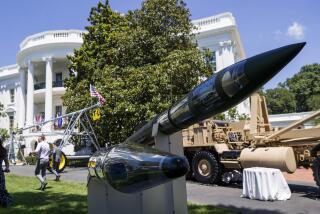U.S. to Send Force in Iraq High-Tech Assistance
- Share via
WASHINGTON — The United States is sending new counter-guerrilla systems to Iraq, including a kind of microphone in the sky to help pinpoint snipers, a Pentagon official said Wednesday.
Other gizmos would help detect roadside bombs and booby traps that have been killing U.S.-led occupation forces, said Anthony Tether, head of the Defense Advanced Research Projects Agency.
The devices use everything from lasers and acoustic sensors to electromagnetic technologies, he said, adding that they would be shipped in four months or less after stepped-up, last-minute development and testing.
“They’re not going to be 100% solutions,” Tether told reporters. “But when you’re in a situation where you have no solutions, even a 25% solution is going to be great.”
One reason for rushing in technology before it was fully proven, Tether said, was “to put uncertainty into somebody who wants to do something [hostile] that now he may get caught.... That’s what we’re trying to do.”
One system uses a ground-based carbon dioxide laser to project a “virtual microphone” with a range of “tens of kilometers” to determine where a shot came from by gauging particle movements, Tether said.
Originally designed to detect things such as ground vehicles over a hill, this system was developed by Santa Barbara-based Mission Research Corp. and has cost about $7 million, he said.
On its Web page, Mission Research shows pictures of lab work on “atmospheric remote sensing” using laser radar, which generates an optical pulse rather than broad radio waves. A receiver system times, counts and processes the returning data. The company did not return a phone call seeking comment.
Other experimental gear would try to home in on the electronics used to trigger roadside bombs, which are typically set off remotely using cell phones or pagers, Tether said.
The new gear has been under development for as long as five years and was not designed for use in Iraq in particular, he said.
More to Read
Sign up for Essential California
The most important California stories and recommendations in your inbox every morning.
You may occasionally receive promotional content from the Los Angeles Times.













